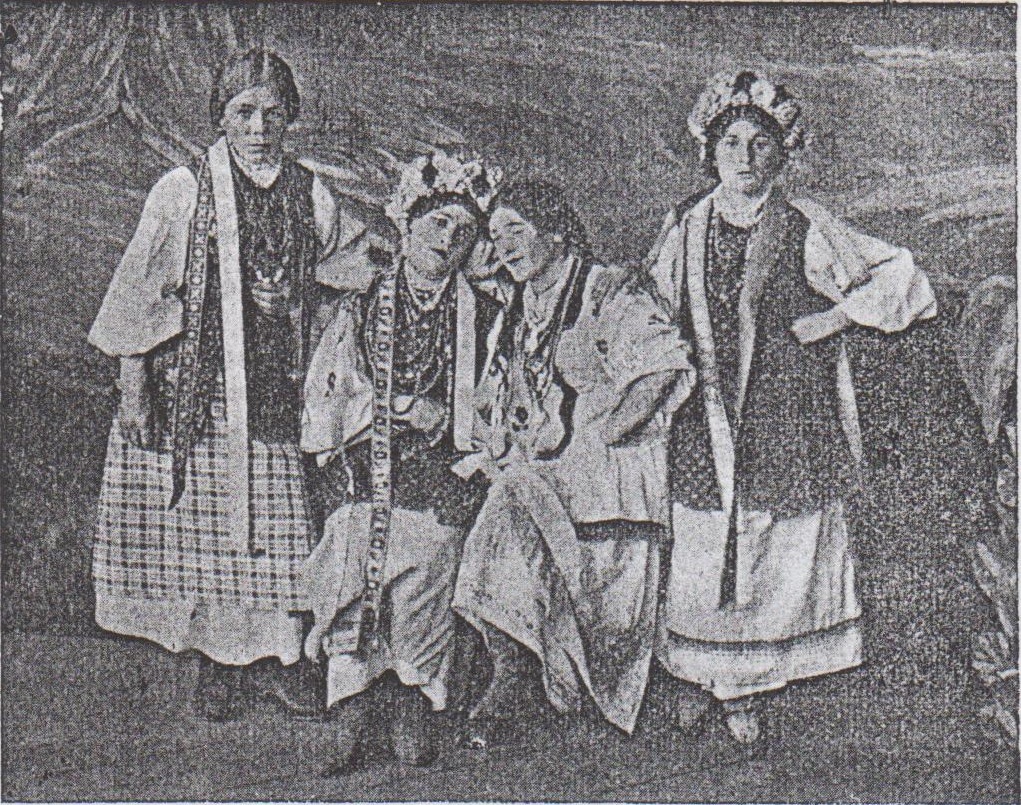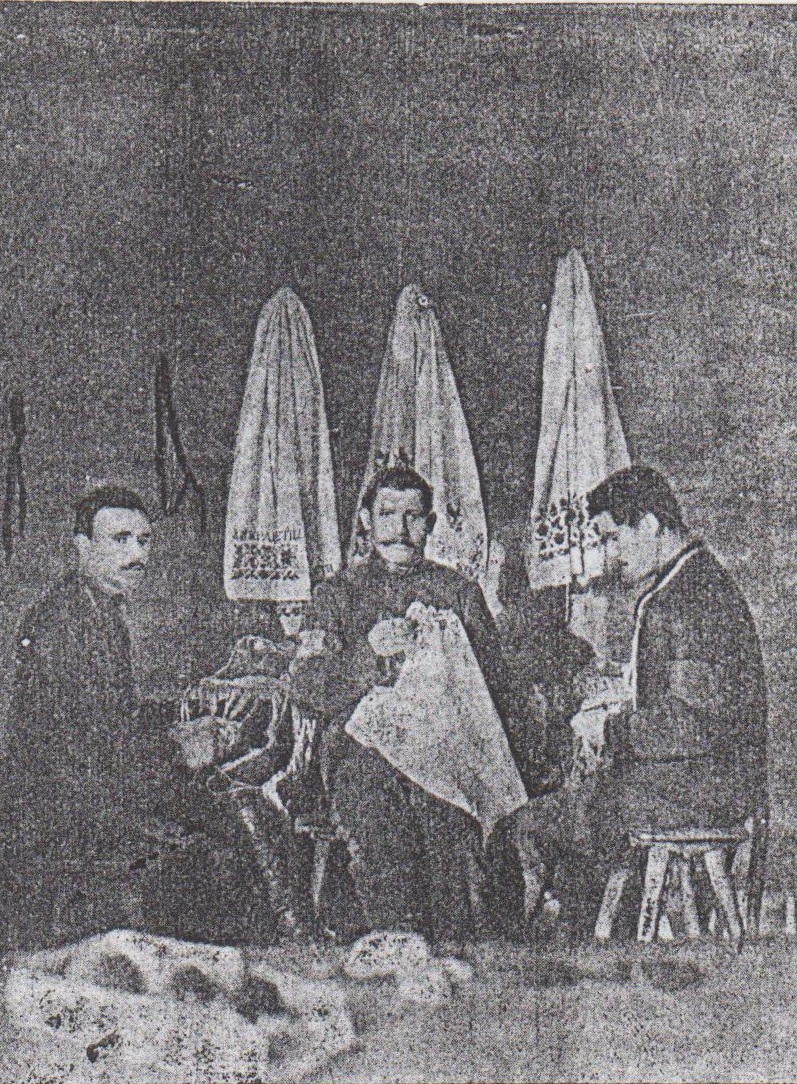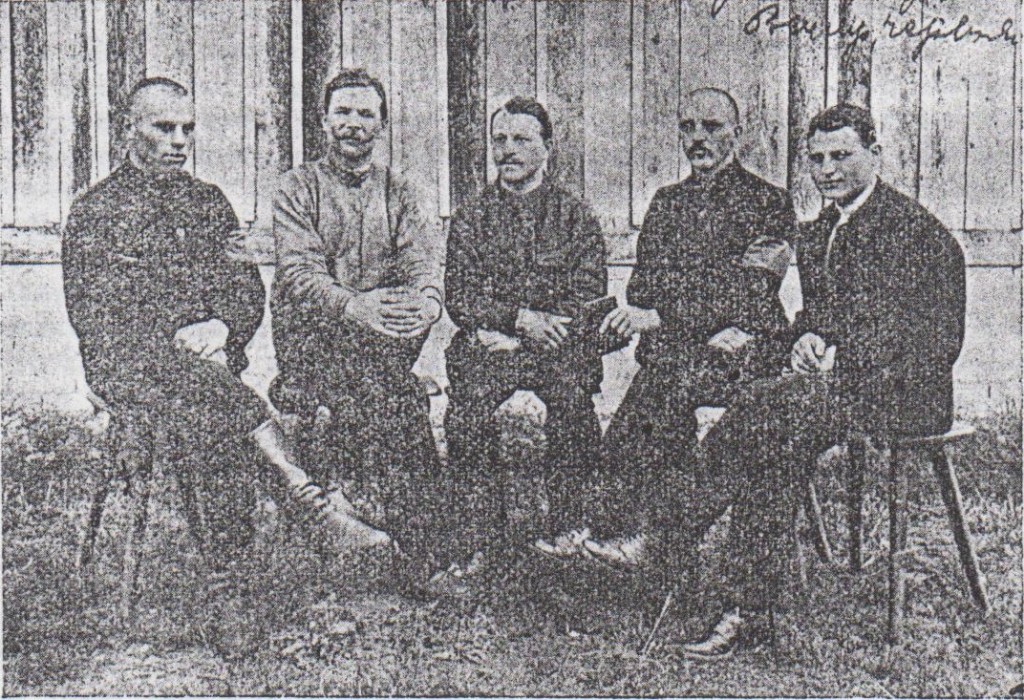
The Russian, and later, Ukrainian revolutions had had an influence not only on the national, but also on the social views of our community members at Wetzlar. [1], [2] We should admit that already in the pre-revolutionary times, the views they held on social issues, were rather radical. First and foremost, obviously was the land question, as it came all the more into our members’ hearts. Without a solution to it, they could not imagine an independent Ukraine, so often spoken of at the camp sessions. And the solution was to be the confiscation and distribution of the large-owners’ lands amongst the working folk. Also discussed were the improvements of industry workers’ fates.
With the revolution’s outbreak and during the whole year up until the prisoners’ departure from the camp in February 1918, their views on the land question saw no serious change. Only few were considering socialization, the majority sticking with their former ideas. Overall, the revolution did not influence our community members, either those at the camp, or those in the labour formations, in terms of crystalising their worldview. The general themes were democracy, freedom and liberty, elimination of social injustice without taking deeper accounts of all those things. Those with party preferences were very few, and, for instance, the Social-Democrats, which would really understand the socialist program and would be willing to implement it, were no more than a handful. That didn’t stop the majority of the community members, however, from calling themselves ‘socialists’ or social-democrats and sympathizing with ‘socialism’. Also, there were several at the camp, who would call themselves socialist-revolutionaries, although that name was not common in the community. Still, everyone felt inside them the revolutionary spirit. It was a small stroke of the spirit, dominating in Russia and Ukraine at the time, yet still it gave our community members extra caliber in both thoughts and words. That caliber was evident in the criticism of the very social order the prisoners had created at the camp.
Yet, while criticizing their own ways in the community, which, in the end, was only evident in May and June 1917 , our community members directed no criticism towards the new government, which had taken hold in Ukraine. The General Secretariat, and firstly, the Central Rada (Council) in Kyiv was deeply respected amongst the community. Not once did any one of its members say a frivolous word about them, or criticize them. That was a very good trait amongst our community members, and proof of the great importance they assigned to the emergence of the new Ukrainian government.
A separate word should be said about the Baptists. They continue to get all the more estranged from the Ukrainian community at the camp, disregarding some exceptions. But now, during the second half of 1918 they started increasingly partaking in the educational and organizational tasks at the camp. Some of them were even notable activists amongst the community, one having for quite some been a member of the General Officers’ Unit. [3] Amongst them were only a few who held an uncompromising view at the Ukrainian question, one of their arguments being, by the way, that the Ukrainian national anthem, which says ‘shall we lay our soul and flesh’ contradicted Christ’s teachings. [4]
Besides the tightly-knit community, which numbered around two hundred men, which continuously remained at the camp, there were other interned, which were employed either at German chancelleries, or at the economic division of the camp, and amongst them, people who were waiting to be redeployed from one group to another. These people were enough for the camp’s population, in the second half of 1917, to number at different stages from 400 to 1000, or more.
These people brought views, which already existed amongst the prisoners in the labour divisions, though would change them more than once under the influence of what they had seen or heard at the camp. In March and April 1917, one could find amongst them plenty of Ukrainophobes. But, in May it was said already, that their views had ‘softened’, [5] and as those who came from the labour divisions, the view was that they were interested in the Ukrainian cause, especially the land issue. [6] In June, news arrived that people employed at the labour divisions held Ukrainophile views and were interested in various political affairs. [7] As for July, we know that people were happy about what was unfolding in Ukraine and satisfied with what the delegate from Ukraine, which had come to Stockholm, replied about the educational work at the camps with the following words: ‘keep doing what you had been doing’. [8] The fact, that there were still isolated individuals, who espoused their old ‘provincial’ views, did not alter the general picture. They were exceptions that the residents of the camp would point their fingers at. One particular guest from a labour division appeared ridiculed, which still in mid-April refused to believe that a revolution had taken place in Russia at all, all of which he considered German make believe. He was certain, that Nicholas II still reigned in Petersburg.
But a comforting fact was that the opponents, or those indifferent to the Ukrainian cause who arrived at the camp were each time fewer and fewer, and, finally, they were hard to come across altogether. The great change that had resulted in the Ukrainians’ moods was evident from the fact that in November 1917, according to rumour, people were singing ‘Our Father’ and also correctly singing ‘Ukraine has not yet perished’. [9]
Put shortly, differences amongst the Ukrainian community and the visitors from the labour divisions with regards to national and political views, became with time less and less. National feelings became highly developed, and as for political issues, all of the interned stood strongly for an independent Ukrainian republic. That was alredy evident in September 1917. In that way, the camp’s residents and the Ukrainian community were one and the same. The camp had become the Ukrainian community.
Notes:
1. This is an exerpt from the work titled ‘The history of the Ukrainian community at Wetzlar’.
2. How the Wetzlar-interned Ukrainians greeted the 1917 revolution, ‘Red Guelder Rose Annals’, 11.
3. It was the supreme authority at the camp, elected by the prisoners.
4. Protocol of the General Officers’ Unit from 03.12.1917.
5. Protocol of the Education Unit of the community from 02.05.1917.
6. See therein.
7. Protocol of the Education Unit of the community from 14.06 and 22.06.1917.
8. Terletsky’s notice from 22.07.1917.
9. Protocol of the General Officers’ Unit from 03.12.1917.
2. How the Wetzlar-interned Ukrainians greeted the 1917 revolution, ‘Red Guelder Rose Annals’, 11.
3. It was the supreme authority at the camp, elected by the prisoners.
4. Protocol of the General Officers’ Unit from 03.12.1917.
5. Protocol of the Education Unit of the community from 02.05.1917.
6. See therein.
7. Protocol of the Education Unit of the community from 14.06 and 22.06.1917.
8. Terletsky’s notice from 22.07.1917.
9. Protocol of the General Officers’ Unit from 03.12.1917.
Omelian Terletsky, "Litopys Chervonoyi Kalyny" ("Red Guelder Rose Annals") magazine, 1932, 12.
Translated into English by ‘Heroyika’ volunteer Alex Miroshnychenko
Галерея
© 2021 All Rights Reserved Heroika
Developed by ZERUM



